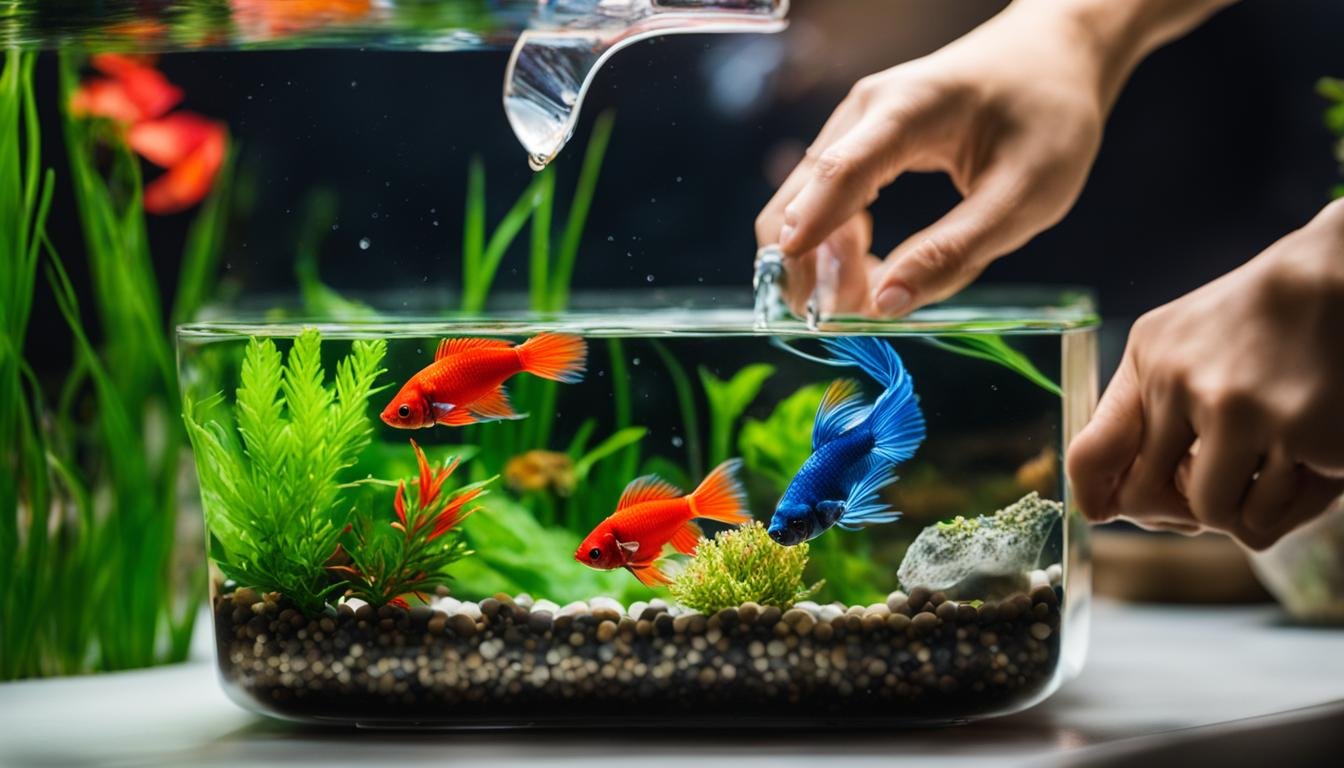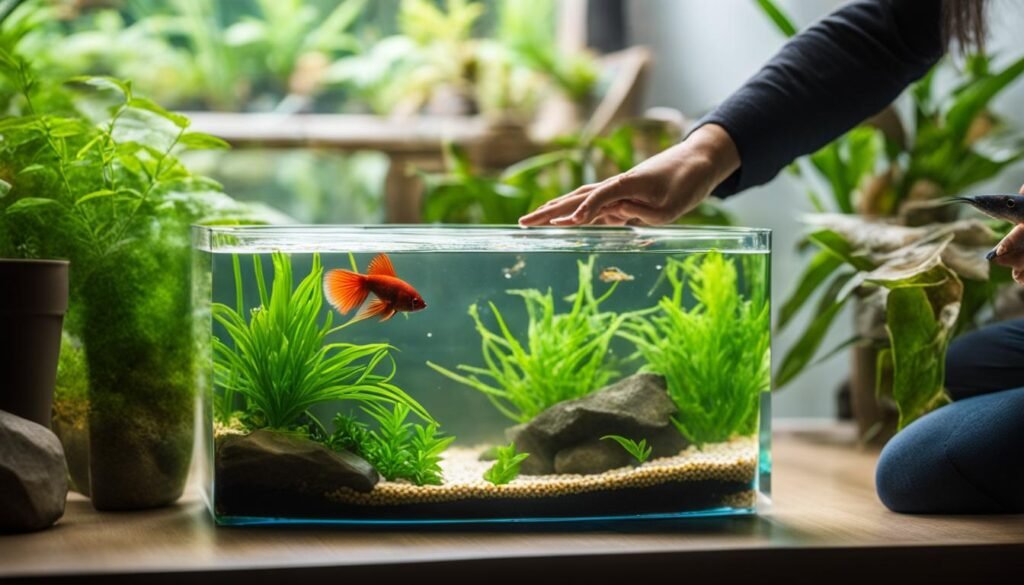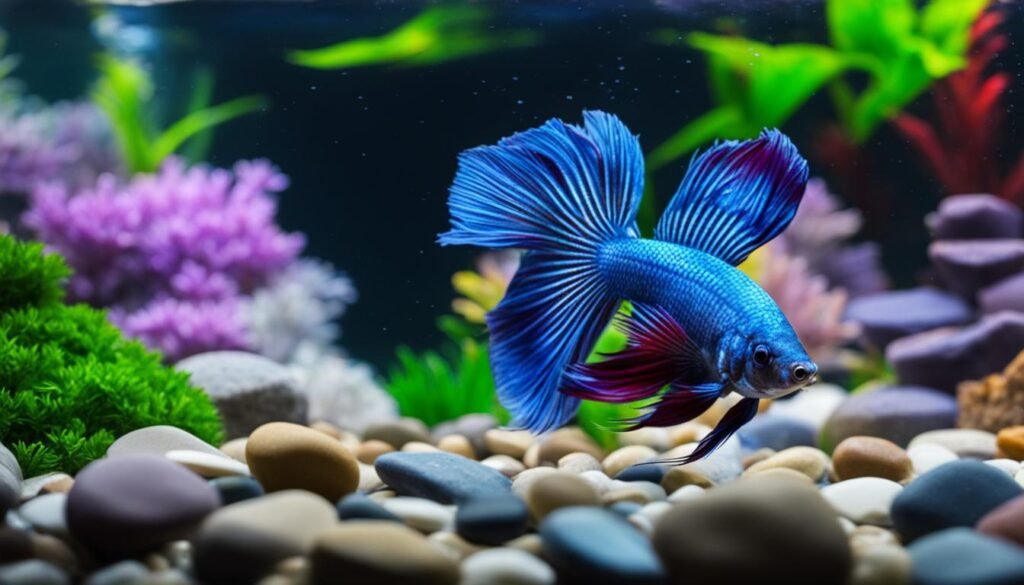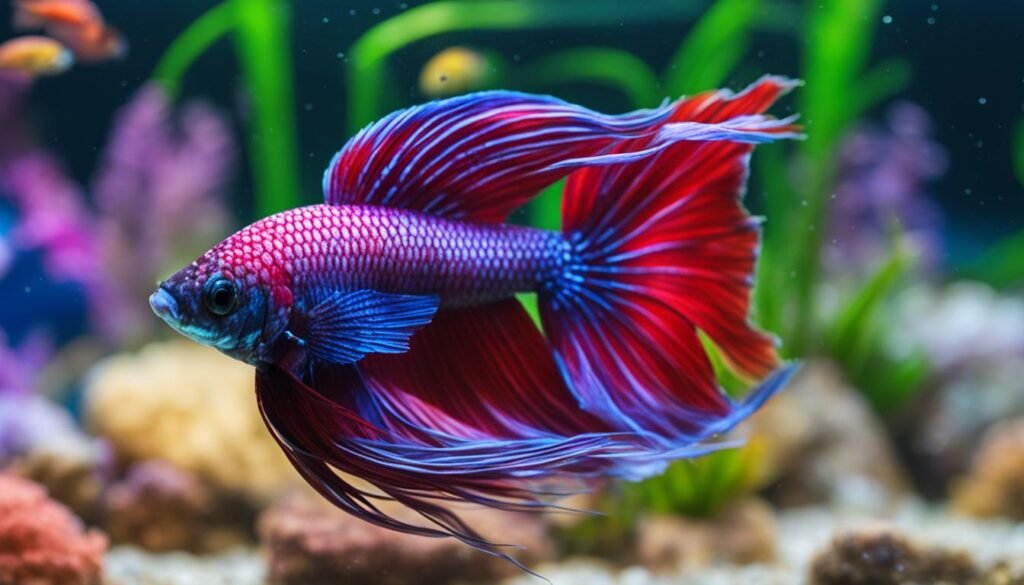Your cart is currently empty!

Discover: Can You Pet A Betta Fish? A Comprehensive Guide.
Are Betta fish suitable pets? Can you pet them and form a bond? These are common questions that arise when considering Betta fish as pets. In this comprehensive guide, we will explore the topic of petting Betta fish and provide insights into their care and interactions.
Key Takeaways:
- While it is not recommended to pet Betta fish due to potential risks, there are alternative ways to bond with them.
- Understanding the natural habitat and behaviors of Betta fish is essential for their care.
- Creating an environment that resembles their natural habitat contributes to their well-being.
- Interacting with Betta fish through training, feeding time, and target training can build connections.
- Providing proper care, a well-decorated tank, and monitoring water conditions are crucial for Betta fish.
Understanding the Betta Fish Environment
When it comes to caring for Betta fish as pets, creating an environment that closely resembles their natural habitat is crucial. Betta fish thrive in warm, stagnant waters, so it’s important to maintain a stable water temperature of around 78 degrees Fahrenheit. Using an aquarium heater can help achieve and regulate the ideal temperature for their comfort and wellbeing.
In addition to temperature, the pH level of the water is also vital. Betta fish are typically found in bodies of water with low pH due to decaying plant matter. You can recreate this environment in the aquarium by using botanicals, such as almond leaves or extracts, or by using buffers. Aim to maintain a pH level between 6.5 and 7.5 to ensure the optimal conditions for your Betta fish.
By providing an environment that closely mimics their natural habitat, you’re not only ensuring the happiness and health of your Betta fish, but also creating an ideal setting for them to thrive and flourish.
The Controversy around Petting Your Betta Fish
When it comes to petting your Betta Fish, there is a heated debate within the fish community. While some people believe that petting can create a bond and show affection, others argue that it can harm the fish and cause unnecessary stress. So, what’s the truth behind this controversy?
Experts advise against petting Betta Fish due to their delicate slime coat, which acts as a protective barrier against bacteria and parasites. Petting can potentially damage this coat, leaving the fish vulnerable to infections. Furthermore, Betta Fish are naturally solitary and territorial creatures, so they may not appreciate human touch.
Instead of petting, there are alternative ways to interact and bond with your Betta Fish. Observing their behaviors and studying their unique personalities can help you understand and appreciate them better. You can also train your Betta Fish to perform simple tricks using positive reinforcement techniques and their favorite treats. This not only stimulates their minds but also strengthens your bond.
Alternative Ways to Interact with Your Betta Fish:
- Observe their behaviors and learn about their unique personalities.
- Create an engaging environment with decorations and hiding places.
- Train them to perform tricks with positive reinforcement and treats.
- Establish a routine and be consistent with your interactions.
Remember, each Betta Fish is unique, and it’s essential to respect their individual needs and preferences. By finding healthy and safe ways to interact and bond, you can provide a fulfilling and enriching environment for your Betta Fish.
Healthier Ways to Interact with Your Betta Fish

While petting a Betta Fish may not be recommended, there are other ways to build connections and interact with them. By engaging in these healthier alternatives, you can ensure the well-being and happiness of your fish.
1. Training your Betta Fish
Teaching your Betta Fish tricks can be a rewarding experience for both you and your fish. By using positive reinforcement techniques and their favorite food as bait, you can train them to swim through hoops, follow your finger, or even jump out of the water. Remember to be patient and take it slow, as each fish has its own pace of learning.
2. Observing feeding patterns
Feeding time offers an opportunity to bond with your Betta Fish. Take the time to observe their feeding patterns and acclimate them to your presence. By consistently being present during their mealtime, your Betta Fish will start associating you with a positive experience.
3. Target training
Target training your Betta Fish using a plastic stick or straw can be a fun way to play and interact with them. Start by introducing the target and rewarding them with food when they touch it. Gradually, you can guide them to perform specific movements by redirecting their attention with the target.
Remember, it’s important to maintain a balanced diet and avoid overfeeding. Building a bond with your Betta Fish takes time and patience, but these alternative methods can provide a fulfilling and enriching experience for both you and your fish.
Tips for Keeping Betta Fish as Pets
If you’re considering keeping a Betta Fish as a pet, there are important tips to keep in mind to ensure their well-being and happiness. Caring for a Betta Fish involves creating a suitable environment, maintaining water quality, and providing proper nutrition. Here are some essential tips for keeping Betta Fish as pets:
1. Providing a Spacious and Well-Decorated Tank
Betta Fish require a tank that provides enough space for them to swim freely. A tank with a capacity of at least 5 gallons is recommended to give them room to explore and exercise. It’s important to decorate the tank with live or silk plants, rocks, and hiding places to create a stimulating environment that mimics their natural habitat.
2. Maintaining Water Quality
Regular water changes are essential for maintaining optimal water quality. Betta Fish produce waste, and allowing it to accumulate can lead to ammonia and nitrite buildup, which are harmful to the fish. It’s recommended to perform water changes of about 25% to 50% of the tank volume every week, while monitoring parameters such as temperature and pH levels to ensure they remain within the appropriate range.
3. Feeding a Balanced Diet
A healthy and balanced diet is crucial for Betta Fish. Feeding them high-quality Betta-specific pellets or flakes, supplemented with occasional treats like freeze-dried or frozen foods, will provide them with the necessary nutrients. It’s important to avoid overfeeding, as it can lead to obesity and other health issues. Feed your Betta Fish a small amount of food once or twice a day, and remove any uneaten food to maintain water quality.
By following these tips, you can provide a comfortable and enriching environment for your Betta Fish and ensure their well-being as pets. Remember to monitor their behavior, as any changes may indicate potential health issues that require attention.
Can Betta Fish Be Affectionate?

When it comes to Betta fish, affection may not be expressed in the same way as with more traditional pets like dogs or cats. However, these beautiful creatures are capable of recognizing their owners and showing signs of recognition and familiarity. By consistently providing care, interacting with them, and establishing a routine, Betta fish can become more comfortable and responsive to their owners.
Building a bond with your Betta fish requires patience and understanding of their natural behaviors. While they may not come running to greet you at the door, they may swim up to the glass or show excitement when you approach their tank. These small gestures can be signs of trust and recognition, indicating that your Betta fish is becoming more comfortable in your presence.
Ways to Bond With Your Betta Fish
- Spend time observing your Betta fish: By sitting near the tank and watching your fish, you allow them to become accustomed to your presence. This can help them feel more secure and build trust over time.
- Talk to your Betta fish: Engaging in gentle conversation with your fish can help them recognize your voice and associate it with positive experiences, such as feeding time.
- Provide regular feeding and care: Consistently providing food and maintaining a clean and comfortable environment for your Betta fish will help them feel safe and secure, leading to a stronger bond.
- Offer enrichment activities: Introduce toys, such as floating plants or small mirrors, to stimulate your Betta fish’s natural instincts and provide mental stimulation.
- Be patient and consistent: Building a bond takes time, so be patient with your Betta fish and continue to engage with them regularly to establish trust and familiarity.
Remember, every Betta fish is unique, and their levels of affection may vary. Some Betta fish may become more responsive and interactive, while others may remain more reserved. By respecting their individual personalities and providing a nurturing environment, you can create a strong and meaningful connection with your Betta fish.
How to Teach Your Betta Fish Tricks

If you’re looking for a fun and interactive way to bond with your Betta Fish, teaching them tricks can be a rewarding experience. While they may not perform tricks in the same way as a trained dog, Betta Fish have the ability to learn and respond to positive reinforcement. Here are some tips to get started:
1. Start with basic commands
Begin by teaching your Betta Fish simple commands, such as swimming through a hoop or following your finger. Use a small hoop or create one using a flexible material like a plastic straw. Hold the hoop in the water and guide your fish through it using their favorite food as bait. Repeat the process consistently until they start associating the hoop with the reward.
2. Be patient and consistent
Training your Betta Fish requires patience and consistency. Practice the commands regularly, keeping the sessions short and enjoyable for your fish. Reward them with their favorite food each time they successfully perform the trick. Remember that every fish is different, so it may take some time for them to fully grasp the training.
3. Don’t push your fish too hard
While it’s exciting to see your Betta Fish perform tricks, it’s important to be mindful of their limits. Avoid pushing them too hard or expecting too much too soon. Keep the tricks simple and ensure they are not too strenuous for your fish. Over time, you can gradually introduce new tricks and advance their training.
By employing these training techniques and using positive reinforcement, you can teach your Betta Fish a variety of tricks and create a stronger bond with them. Remember to always provide a balanced diet and avoid overfeeding to ensure their overall health and well-being. Get creative, have fun, and enjoy the process of teaching your Betta Fish new tricks!
Conclusion
After exploring the world of Betta Fish as pets, we have learned that while petting them may not be recommended, there are plenty of other ways to bond and interact with these fascinating creatures. By understanding their natural habitat and providing them with a pet-friendly environment, we can ensure their health and well-being.
Caring for a Betta Fish involves maintaining a stable water temperature and pH level, as well as providing them with a spacious and well-decorated tank. Regular water changes and tank maintenance are essential for their overall health. By following these care guidelines, we can create a comfortable and enjoyable environment for our Betta Fish.
Alternative forms of interaction, such as training them to perform tricks or target training, can help build a strong bond with our Betta Fish. By employing positive reinforcement techniques and using their favorite food as bait, we can engage them in stimulating activities that promote mental and physical stimulation.
By prioritizing their health and well-being, we can ensure that our Betta Fish experience a pet-friendly environment. Caring for a Betta Fish is a rewarding and fulfilling experience that allows us to appreciate the beauty and uniqueness of these remarkable pets.
FAQ
Can I pet my Betta Fish?
It is not recommended to pet your Betta Fish. Petting can damage their slimy outer layer and cause stress.
How can I interact with my Betta Fish?
There are alternative ways to interact with your Betta Fish, such as training them to swim through hoops or follow your finger.
What is the ideal water temperature for Betta Fish?
Betta Fish thrive in water temperatures around 78 degrees Fahrenheit, so it is important to use an aquarium heater to maintain this temperature.
How can I create a habitat similar to their natural environment?
To replicate their natural habitat, you can use botanicals like almond leaves or extracts and maintain a pH level between 6.5 and 7.5.
How should I care for my Betta Fish’s tank?
Proper care involves providing a spacious tank with decorations, avoiding overcrowding, using a filter with adjustable flow, and performing regular water changes and maintenance.
Can Betta Fish recognize their owners?
While Betta Fish may not show affection like dogs or cats, they can recognize their owners and display signs of recognition and familiarity.
Can I train my Betta Fish to perform tricks?
Yes, you can train your Betta Fish to swim through hoops or follow your finger using positive reinforcement techniques and their favorite food as bait.
How can I build a bond with my Betta Fish?
Building a bond requires patience, consistent care, interaction, and understanding of their natural behaviors.
Leave a Reply